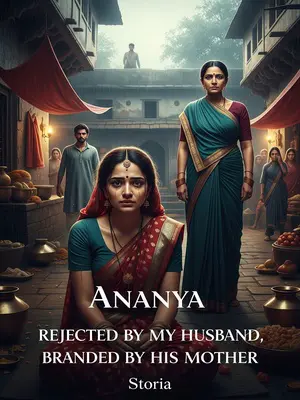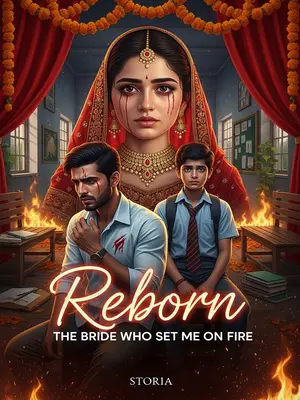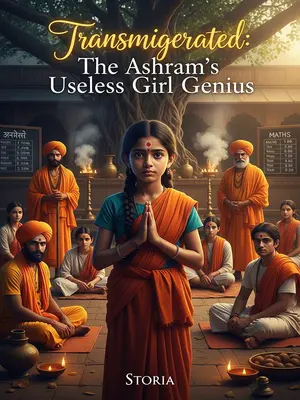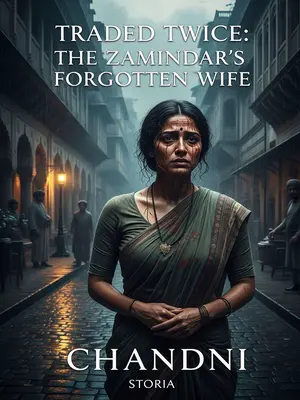Chapter 2: Ananya’s Spirit and the Slap
When he opened his eyes again—
There was a strong scent of jasmine oil, the weight of a long plait brushing his neck, and the faint sound of temple bells drifting through the open jali window. The feel of a thin cotton saree and a faint ache in the wrists as if someone had been meditating for hours. Rohan had been reborn.
Reborn into the body of a young woman.
He blinked. The world looked different, softer at the edges, but there was a heaviness—maybe from the plait weighing against his back.
"Senior, yeh kya hua? Can you please give my body back? My name is Ananya…"
A quavering, almost childlike voice echoed around him. The woman’s spirit hovered nearby, trembling with fear. She looked like someone you’d see on Raksha Bandhan, running from the kitchen to the pooja room, a little lost, a little innocent.
She had been meditating, doing her sadhana, when suddenly another spirit barged in and took over her body.
This, of course, was the sort of thing that would make any Dadi cross herself and call for a lemon-chilli charm. But here, the girl’s ghostly figure just floated, eyes brimming with tears, as if she’d lost her favourite dupatta.
Rohan turned to look.
He tried not to gawk, but seeing your own self as a separate spirit could shake anyone’s nerves. Her nose ring gleamed, her eyes were big and trusting—like a heroine from those old black-and-white films.
The spirit looked like a miniature version of the original self.
She really did. Just softer, with a little more hope in her face, like the younger sister who still believed everything could be sorted out if you just told Maa the truth.
He could clearly see her original appearance.
The woman’s name was Ananya—truly a stunning beauty.
Ananya. The sort of name mothers picked out from pooja books, hoping their daughters would grow up to be pure-hearted and strong. She looked every bit the part—eyes like monsoon clouds, hair thick and wavy, skin with that gentle wheatish glow.
It was just that her temperament was still lacking.
Bahar se she was all poise, but andar se, you could tell she was unsure, nervous. Even her saree pallu wasn’t draped as confidently as the older didis.
A dignified sadhak at the highest stage, yet after losing her body, her first reaction was to reason things out.
Only in an Indian setting would someone, having just been ejected from their own body, politely request it back, as if discussing the right to a tiffin box. No shouting, no melodrama—just quiet, respectful negotiation. Typical.
"No wonder even a junior didi just starting out dared to confront you in the main hall."
Rohan was speechless for a moment.
He muttered, half to himself, "Yaar, asli problem yeh hai. Too soft-hearted. People take advantage."
"What main hall?" Ananya was confused.
Just then—
A man’s voice came from outside.
The voice had that authoritative ring—a tone you’d hear from a senior in the NSS camp, or a strict elder brother. "Didi Ananya, junior didi has lost a Prakriti Suvarna Mani. Bhaiya wants you to come to the main hall for a confrontation."
Rohan was startled.
Only then did he realise:
He hadn’t just transmigrated into that women-centric novel—he had become the protagonist, Ananya.
The current timeline was exactly when the junior didi accused Ananya of stealing the ashram’s ancestral Prakriti Suvarna Mani and asked the senior bhaiyas to uphold justice.
It was the same as that turning point in the book, right before everything began to unravel. He could almost hear the temple drums, the heavy air inside the hall, the tension.
"Senior, I didn’t steal the Suvarna Mani. I must go and explain myself."
Ananya grew anxious.
Her spirit wrung her hands, fingers clenching the edge of her pallu, knuckles whitening as she remembered Bhaiya’s cold stare. "If people start saying things, my izzat is gone. My marriage—senior bhaiya, he’ll think badly of me. Then what?"
This matter would ruin her reputation.
In ashram life, as in any Indian family, reputation was everything. The neighbourhood aunties and the elders—everyone would remember this for years. Even after a hundred good deeds, one stain would be gossiped about endlessly.
She also had a marriage contract with the senior bhaiya. If he misunderstood, who knows what trouble might follow?
In their world, engagement was as sacred as marriage. Breaking such a bond brought shame not just on the girl, but on her parents, her Guruji, everyone who had trusted her.
Rohan smiled faintly. "No problem. I’ll go in your place."
He adjusted the pallu on his shoulder, as if settling into the role. A calmness settled over him, the sort of confidence you’d see in a lawyer before entering the High Court.
"Really, is that alright?" Ananya was a little uneasy.
Her spirit hovered close, as if wanting to clutch his arm, her trust mingled with confusion. "Aapko samajh hai na, senior? Please... don’t make it worse."
"Of course."
Rohan looked confident.
He gave her a reassuring nod—the kind you’d see a big brother give before facing the school principal. "Bas, leave it to me."
Only then did Ananya feel a bit relieved.
A flicker of hope passed across her face, like a child who’d been promised a treat after a day of fasting.
What she didn’t know was—
Rohan sneered coldly in his heart.
Inwardly, he muttered, "Woh fiancé? Senior bhaiya? Already has his eye on junior didi. Sab kuch setting hai, yaar."
Fiancé? Senior bhaiya? He’d already gotten together with the junior didi.
This so-called confrontation was just a one-sided interrogation.
The kind of thing you see in soap operas—the innocent always cornered while the schemers smirk behind their dupattas. Not this time, Rohan decided.
Since he was here, how could he let that happen?
He opened the door.
Outside stood an outer ashram disciple.
The boy was lanky, nervous, the sort who’d always stand at the back during aarti and look for a chance to sneak out early. His kurta was wrinkled, and he held his notebook awkwardly.
Now that Rohan had taken over Ananya’s body, he saw through the other party’s sadhana at a glance.
Just a beginner.
Ant.
That was Rohan’s conclusion.
If this were a schoolyard, this boy wouldn’t last a day. The difference in strength was like comparing a first-year kid to a university topper.
When the disciple saw Ananya, he looked impatient. "Bhaiya is furious, and you’re still wasting time? Hurry up and come with me."
The arrogance in his voice was grating—the sort of tone used by a peon who has just received a new badge and feels he can order the principal’s daughter around.
Hmm?
Rohan looked at the disciple coldly and asked, "Who are you?"
He fixed the boy with a gaze that would make even the boldest child shrink. The silence in the corridor grew heavy; the faint sound of the prayer bell seemed to stop for a second.
The person hadn’t yet answered.
Ananya’s spirit anxiously said, "Senior, if we don’t hurry, bhaiya will punish us!"
"Punish?"
Rohan raised an eyebrow.
A mid-level sadhak punishing a master sadhak?
He almost laughed. "Kya zamana aa gaya hai," he muttered, "when children start scolding their elders."
What kind of life did the protagonist lead?
The disciple was stunned for a moment, then replied, "I am outer ashram disciple Amit."
His voice wavered a little, as if he suddenly remembered his place.
Before he could finish—
A moment of tense silence stretched—Amit’s eyes darted, someone’s sandals squeaked on the floor, and Rohan’s hand tightened around the pallu.
Pa.
A crisp slap.
The sound echoed down the corridor, sharper than the temple bell during evening aarti. A sharp tang of sweat and fear filled the air, and someone’s WhatsApp notification pinged in the background—ignored by all.
Rohan suddenly slapped him across the face.
Amit was sent flying, landing heavily on the dusty ground outside the ashram.
The physical strength of a master sadhak—even when holding back—was not something a beginner could withstand.
No exaggeration: a master could wipe out a crowd of beginners with just a thought.
"So you know you’re an outer ashram disciple?"
"Remember your place. If you dare disrespect your didi again, it won’t just be a slap."
Rohan’s words carried a trace of real threat.
His voice dropped low, cold as the Ganga on a winter morning. Even the birds outside seemed to hush for a moment.
The air seemed to freeze; the temperature dropped sharply.
Life and death decided in a single thought.
Amit trembled all over.
He clutched his cheek, staring in horror—the sort of look you’d see on a child caught stealing from the prasad box.
At this moment, he truly realised the power of a master sadhak.
In the whole ashram, only the guru and Ananya had reached this stage.
The guru was mid-level; Ananya had already reached the advanced stage.
Neither had ever shown their full strength, so the disciples had little understanding of true power.
Most had only heard stories—like those old tales your Dadaji tells about long-gone saints.
Rohan ignored Amit and strode straight towards the main hall.
The corridor’s checkered sunlight danced at his feet; the old portraits of past sadhaks seemed to watch approvingly.
"Senior, Amit is treacherous by nature. He’ll definitely go to the discipline committee to complain," Ananya said worriedly.
She sounded just like the class monitor, forever worried about teachers and prefects. "He’s always running to tattletale—now what?"
"Discipline committee?" Rohan couldn’t help but laugh. "If they handle minor matters, then those matters will disappear. If they try to handle me, then they’ll be the ones to disappear."
"Arrey baba, let them try. Let’s see kaun kiska asli chehra dikhata hai." His grin was almost wicked, the kind that would scare off even the local goon.
"Uh..." Ananya didn’t dare say more, murmuring weakly, "But hitting people is still wrong."
She bit her lip, torn between relief and guilt. "Guruji always says, ‘Forgive, don’t hit.’"
"Just now, didn’t it feel good?" Rohan asked.
His tone softened, almost teasing, as if coaxing a child to admit she liked the taste of forbidden street food.
"It did feel good," Ananya admitted.
Her face brightened, if only for a second. That slap just now was the most satisfying moment of her life—a feeling like finally letting out a long-held breath.












